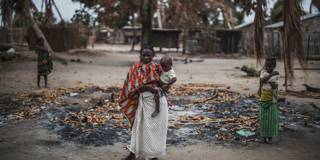As humanitarian organizations work to provide adequate food, water, and shelter to Mozambique's displaced people, delivering contraceptives may seem to be of secondary importance. But failure to ensure their availability will not only deepen the crisis today; it will prevent Mozambique from reaching its potential tomorrow.
MAPUTO – In Mozambique’s Cabo Delgado province, a perfect storm of conflict, cyclones, COVID-19, and cholera has erupted, creating a severe – and escalating – humanitarian crisis. September estimates show that more than 250,000 of an estimated 2.5 million people – 10% of the province’s population – are now internally displaced. More than half of children under the age of five are chronically malnourished. And Cabo Delgado province has recorded the country’s third-highest number of COVID-19 cases in October.
As humanitarian organizations work to provide adequate food, water, and shelter – in the midst of a pandemic, no less – delivering condoms and other contraceptives may seem to be of secondary importance. But failure to ensure the accessibility of family-planning tools will not only deepen the crisis today; it will prevent Mozambique from reaching its potential tomorrow.
Even before the current crisis, Cabo Delgado’s women and girls were highly vulnerable, owing to factors ranging from poverty to highly patriarchal social norms. Such norms – and the gender-based violence (GBV) they enable – inhibit their ability to exercise their agency and rights, and can directly threaten access to and use of contraception.

MAPUTO – In Mozambique’s Cabo Delgado province, a perfect storm of conflict, cyclones, COVID-19, and cholera has erupted, creating a severe – and escalating – humanitarian crisis. September estimates show that more than 250,000 of an estimated 2.5 million people – 10% of the province’s population – are now internally displaced. More than half of children under the age of five are chronically malnourished. And Cabo Delgado province has recorded the country’s third-highest number of COVID-19 cases in October.
As humanitarian organizations work to provide adequate food, water, and shelter – in the midst of a pandemic, no less – delivering condoms and other contraceptives may seem to be of secondary importance. But failure to ensure the accessibility of family-planning tools will not only deepen the crisis today; it will prevent Mozambique from reaching its potential tomorrow.
Even before the current crisis, Cabo Delgado’s women and girls were highly vulnerable, owing to factors ranging from poverty to highly patriarchal social norms. Such norms – and the gender-based violence (GBV) they enable – inhibit their ability to exercise their agency and rights, and can directly threaten access to and use of contraception.